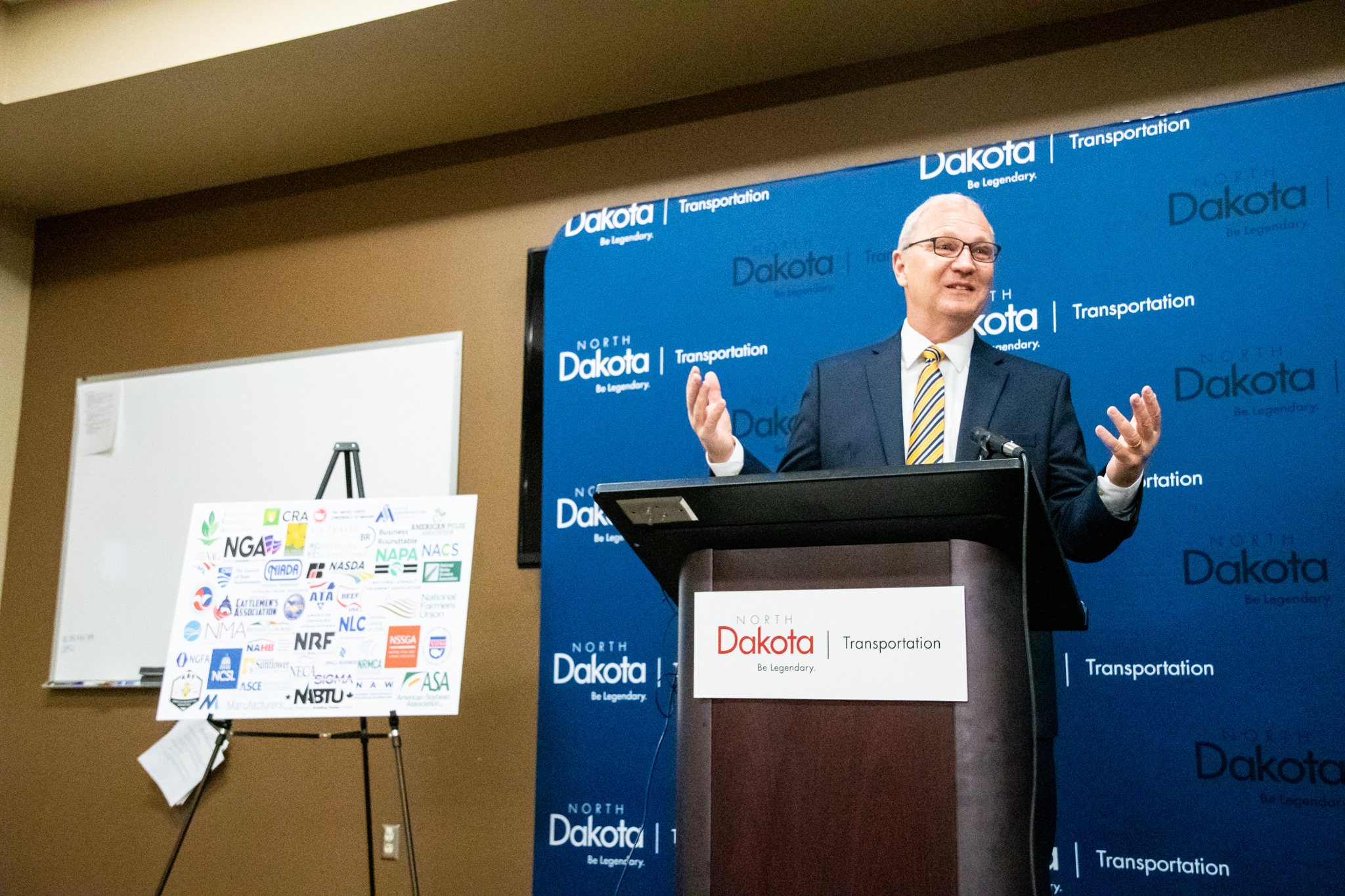BISMARCK – U.S. Senator Kevin Cramer (R-ND), Ranking Member of the Senate Environment and Public Works (EPW) Subcommittee on Transportation and Infrastructure, hosted a press conference this morning to discuss the Infrastructure Investment and Jobs Act, which has now passed both chambers of Congress. Senator Cramer was joined at the press conference by North Dakota Department of Transportation Director Bill Panos, North Dakota Associated General Contractors Executive Vice President Russ Hanson, and Greater North Dakota Chamber President and CEO Arik Spencer.
Senator Cramer highlighted permitting reform, grant programs for rural communities, increased finding and flexibility for NDDOT, energy, drinking water and wastewater infrastructure, and additional wins for North Dakota in the Infrastructure Investment and Jobs Act. Excerpts and the full video are below.
“There are really two things in our U.S. Constitution that the federal government is charged with, everything else is left to the states. One of them, of course, is national security and the other is interstate commerce. The interesting thing particularly about surface transportation is that it’s a combination of the two. It is our federalism system at work. Federalism is such a big part of the bipartisan infrastructure bill that was passed and will be signed into law later this week.
“We get the opportunity so often in Washington to brag about the exceptionalism of North Dakota. At the end of the day I work for the people of North Dakota, the employers and employees, and most importantly those that build out the infrastructure that moves commerce.
“What I look for is opportunities where there are winners on all sides. And that’s what we have in this bill. The bipartisan Infrastructure Investment and Jobs Act is the right thing to do for North Dakota and our country.”
Click Here to Watch Full Press Conference
Click here for a two-pager on the Infrastructure Investment and Jobs Act.
About the Infrastructure Investment and Jobs Act
The bipartisan Infrastructure Investment and Jobs Act is a $1.2 trillion bill with $550 billion in new spending over the next five years, which includes:
- $2 billion for North Dakota’s roads, bridges, and highways.
- 50% increase over the next five years in contract authority for North Dakota Department of Transportation ($125 million more per year above current levels).
- $225 million is set aside for North Dakota to improve and upgrade bridge infrastructure.
- $66 billion for passenger and freight rail.
- This investment is in addition to Senate Commerce Committee’s $78 billion Surface Transportation Investment Act which the committee passed earlier this year with strong bipartisan support.
- $65 billion for broadband grants to states for the expansion of broadband infrastructure.
- $47.2 billion for cybersecurity and flood and drought mitigation.
- $18 billion for carbon capture technology and reliable, emission-free nuclear power.
- $16 billion for ports and waterways.
- $11 billion for highway safety programs and pipeline repair.
- $2 billion grant program set aside for rural communities.
- A new apprenticeship program to allow 18 year olds with Commercial Driver’s Licenses to drive across state lines, which will help address the severe shortage of truck drivers and requisite supply chain problems.
The bipartisan bill includes methods for paying for the increased spending without raising taxes on the American people, such as repurposing $210 billion in funds previously authorized for COVID-19 relief. Click here for a summary of the bill.
Benefits for North Dakota
Specific to North Dakota, the bill authorizes over $2 billion for the state’s roads and highways and over $200 million for clean water. In addition, over $200 million is included to fund projects that support construction, maintenance, and repair of bridges, many of which are considered structurally deficient in the state.
The North Dakota Department of Transportation, the North Dakota Chamber of Commerce, North Dakota Farmers Union, North Dakota Rural Water Systems Association, Associated General Contractors of North Dakota North Dakota-based National Sunflower Association, and North Dakota Concrete Council, all issued statements in support of the bipartisan infrastructure bill and Senator Cramer’s work on it. Click here to read their statements.
Cramer Priorities Secured
The Infrastructure Investment and Jobs Act uses as its foundation the Surface Transportation Reauthorization Act, a bill Senator Cramer helped write and unanimously pass through the EPW committee in May 2021. That $303.5 billion investment in transportation infrastructure contained some of Senator Cramer’s highest infrastructure priorities, which the bill passed today kept intact, including:
- Distributing more than 90 percent of the transportation funding via the current funding formula so state and local governments have guaranteed funding and flexibility to meet their constituents’ needs, and
- Codifying permitting reforms like the Trump Administration’s One Federal Decision rule which will allow transportation infrastructure projects to be completed in a much more expeditious manner. It also allows for expedited permitting of gathering lines on federal land and energy-producing tribal land for those who choose to participate.
The bill also limits the expansion of urban transit programs and includes three of the senator’s bipartisan bills:
- REGROW Act supporters issued statements thanking Senator Cramer for his work to secure the REGROW Act’s passage.
Throughout this year, Senator Cramer has used numerous hearings, floor speeches, and media appearances to call for a smart, significant investment in American infrastructure. He spoke twice on the Senate floor about the effort, delivering remarks about why Congress should make such an investment and the negative consequences of inaction.
